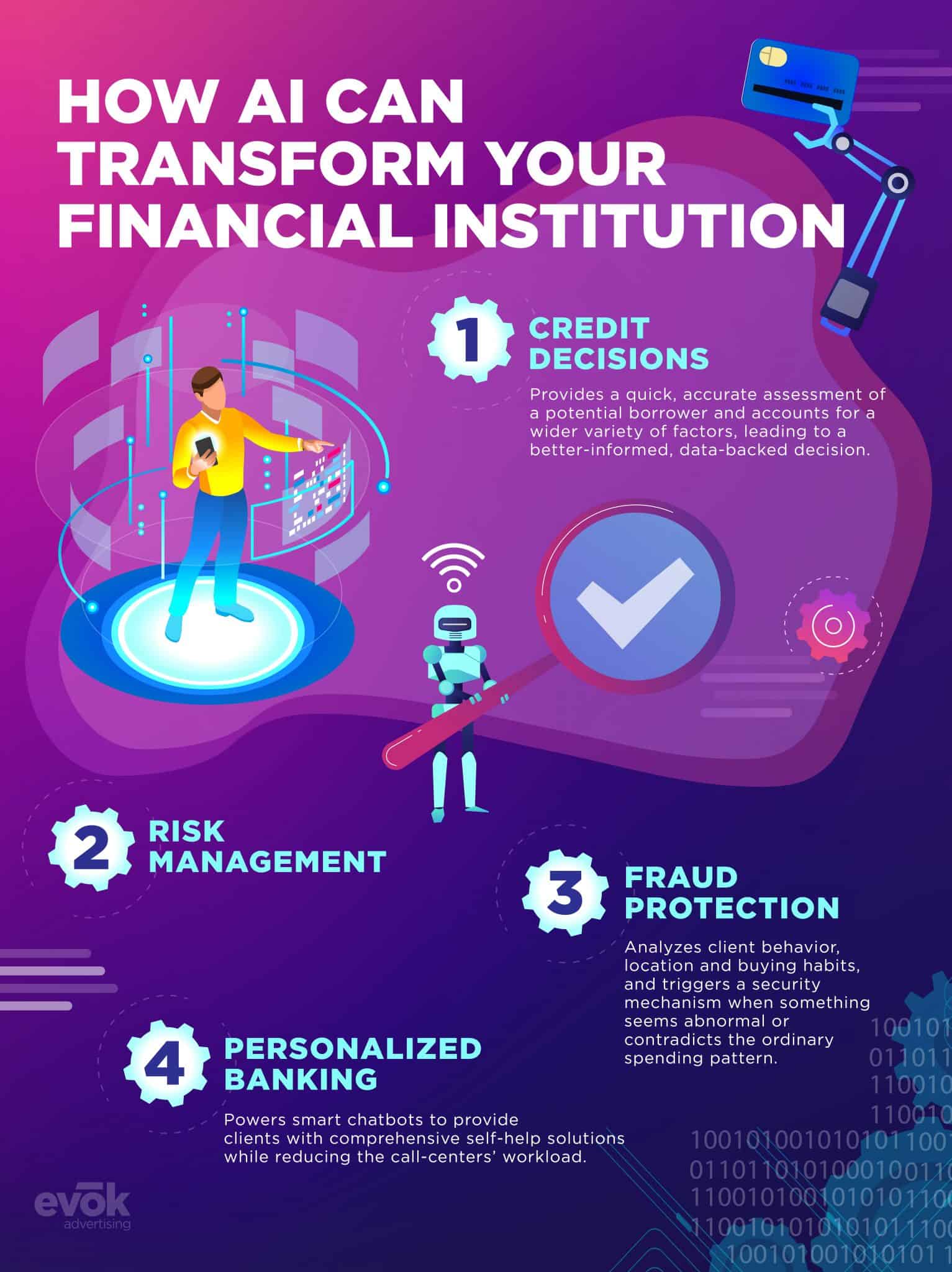
Enhancing the Financial Experience Through AI

The Digital Era of Big Data
The advanced technology of artificial intelligence (AI) has eased the experience of everyday lives—so much that it oftentimes goes unnoticed. From gathering data on buying habits for personalized product recommendations to calculating traffic and construction when delivering directions on Google Maps, AI has become the helping hand that many can’t remember a life without it.
Artificial intelligence is no longer a tale of the future, it is here, and it is easing the flow of financial businesses and your customers’ experiences. Technology driven industries like the finance sector are finding that AI integration is applicable in more than just one aspect of the business flow, and in turn, has become a popular and necessary investment among banks and credit unions.
From handling customer transactions and assessing fraud detection to bringing personalization to the customer experience, the gold rush toward AI is for the simple fact that it will bring financial leaders a cleaner, safer and more accurate business model with little to no risk. And according to Autonomous Next’s 2018 Machine Intelligence forecast, financial institutions are poised to save more than $1.0 trillion by 2030 if they incorporate systematic investment in AI technologies into their business models.
Bringing Humanization to Personalization
Artificial Intelligence is setting a new standard of digital excellence for banks and credit unions—a standard that settles for nothing less than a seamless online banking journey based customers’ wants and needs. This technology that performs humanlike functions, including learning, decision making, planning and speech recognition, has brought a new level of convenience to the customer and member experience.
These functions are now engraved into every facet of the banking experience, shifting an era of face-to-face interactions to predominantly screen-to-face. While this serves the impression that we’re drifting into a depersonalized world, 63% of global banking users have stated that they are willing to trade personal data for personalized advice.
To really optimize on the ROI-boosting benefits of this blend of humanization and personalization, your financial institution should understand why conversational AI is gaining popularity and how they’re tailoring each customer interaction to their own.
Available anytime, anywhere
On average, Americans waste 900 million hours waiting on hold every year. And, the average individual will spend 43 days on hold over the course of their life. But according to American Express Global Customer Service Barometer, customers are only willing to wait for a maximum of 13 minutes on hold per session and those 13 minutes seem like forever unless a person is multi-tasking.
This means that customers demand assistance promptly and expanding call center hours isn’t proving to be an effective solution for congested phone lines. Financial institutions that have implemented conversational AI are leading customers to answers quickly and accurately while moderating the hours of staff operators. The best of both worlds.
Consistency
Training a diverse staff means receiving a diverse set of answers from each customer service representative. While the information provided during customer service training remains consistent, each answer and interaction will vary depending on the customer, representative and other external factors.
With conversational AI, that inconsistency is completely extracted. As a programmed machine, conversational AI will provide reliable, predictable responses every single time. Our client IBM Southeast Employees’ Credit Union, for example, has developed its own virtual agent, using AI to offer a standard of consistent guidance to customers, so the firm can bypass the training and hiring process for more customer service personnel.
“IBM Southeast Employees’ Credit Union is upgrading their phone system and has created a friendly personal banking assistant persona for their members to identify with. If members call in with their registered pin number, intelligent routing is used so members get answers to their questions quicker. IBMSECU has noticed with these upgraded AI features, the members are happy and the call volume is decreasing allowing for better customer service” states Cheryl Parker, director of client services.
Fraud Prevention
Members of banks and credit unions put immense trust into their financial institutions as they play a safe haven and trusted resource for their financial needs. Money circulating through these institutions introduce a degree of risk every day and it’s up to you to provide the extra bubble of protection. While fraud detection is a constant battle for any financial institution, reducing the likelihood of these triggers have become easier with the help of AI.
AI has proven to be a powerful ally in the finance space when it comes to analyzing real-time activity in any given environment. It can use past spending behaviors to differentiate abnormal transactions—such as spending in a foreign country or unusual account withdrawals—and bring it to the attention of customers and members within just hours, giving both parties some ease of mind.
What’s even better about AI technology is that if red flags are raised on a consented transaction and your staff waives the fraud alert, then AI will note this in its algorithm to make even more educated decisions about what should and should not be considered fraud.
AI is Here to Stay, But Not to Replace
With the ability to continuously learn data patterns and adapt to existing patterns, AI provides a great scope for enhancing current services while offering the opportunity to develop new strategies to simplify the customer experience. This advanced technology can regularly study the market to better target customers and reach them in ways that aren’t humanly possible.
That being said, it’s important to not confuse technological advances for the replacement of human interactions. Artificial intelligence is here as the stepping stool in reaching and retaining your customers, but the human touch will remain indispensable. Members seek reassurance that their finances are in good hands, and when times get tough, they want you there to guide them to an appropriate solution.
AI is here to manage repetitive tasks, detect and prevent fraud, and create a personalized experience, so that your staff can focus on relationship building and customer satisfaction.
